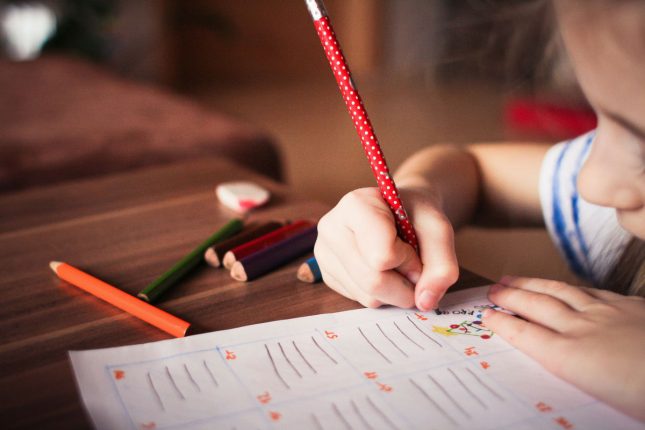My eldest daughter was just one of those kids you never had to ask to do their homework. She flew in the door from school, nearly knocking me over if I got between her and the loo, ate whatever she could find, and disappeared into her room to study. Schoolwork was just easy, and fun, for my daughter. Clearly she doesn’t have an undiagnosed learning disability.
Margot did well at school and well at University and along the way I got a lot of compliments too, ‘great study habits you’ve instilled there’.
I’m not sure I can take much of the credit. The fact is, Margot just liked studying, and it came easy to her. She was doing what she was good at and what she enjoyed. Her success was recognised by school and she felt really good about herself and her work.
In the work I do in learning support I see a lot of students who work really hard.
The children I support have recognised learning or behavioural difficulties such as:
- ADHD
- Hyperactivity
- Auditory or visual disability
- Autism
- Aspergers
These kids are often aware they work 3 times harder than their peers in a school day. They know they need to build in time to rest and relax at home. They know they’ll need support in school to achieve their potential. They’re often very good at finding the help they need, and know a lot about their own learning needs, which is great.
Does your child have an undiagnosed learning disability?
But, there is another group students out there who both parents and teachers have to be more alert to.
This group may even slip by unnoticed in Year 9 and 10. They pass assessments, work hard and are seen as great kids.
Sure you’ve always known they were poor spellers. Maybe they write a little slowly and they don’t have a full set of notes, or they can’t remember instructions, but they’re passing in class so they’re doing ok and seem happy. Right?
But, by their senior years maybe they start to fail in some of their classes.
Their homework isn’t always done, or handed in completed. They seem to get sick more and ask to stay home more. Maybe they seem a lot more tired or irritable. Perhaps they are upset about their workload and you try to help . You suggest that if they just do more , try more , study smarter , work faster things might get easier to manage. Maybe your child really does try to do all that. Maybe things get better for a while and then, quite simply, they cannot keep it going.
These are the students who all too often end up on my doorstep anxious, embarrassed, depressed and exhausted.
They’ve often managed to cope alone, with sometimes complex learning disabilities, by putting a superhuman effort into their schoolwork. They feel guilty for their lack of success. And sometimes they tell me they’re lazy or they used to do well at school but just can’t do it anymore. They’re often confused and worried and usually their parents are too.
Dyslexia and dyspraxia
Parents and teachers will tell me later on down the track how guilty they feel that they didn’t realise the young person was dyslexic or dyspraxic. Or they had another processing disorder (or any one of many possibilities actually).
We can take some comfort in research which identifies this group of students as being diagnosed with learning difficulties later than many other groups. This is probably because they learn to develop coping strategies at school. They appear to manage well at school for many years. But eventually their coping strategies no longer work, and this can lead to serious burnout in the last few years of high school.
Here’s just some of the signs to look out for, especially if these manifest beyond the age of 7 years:
Dyslexia
- a persistent tendency to write letters and numbers backwards beyond the age of 7 years
- a persistent tendency to begin writing on the right hand side, at the bottom or in the middle of the page
- a persistent tendency to run all of the words together when writing
- poor visual memory for the shapes of letters, can do it correctly one day but has forgotten by the next
- confusion between letters such as b, d, p, q , g and when reading and writing
- poor visual memory for the shapes of words
- difficulty associating and remembering the shape of a letter with its sound
- a persistent tendency to mishear the order of sounds or syllables in a word.
Dyspraxia
- Clumsy and accident prone from a very young age
- Frequently bangs into things or people
- Slow to learn to crawl and walk
- Uncoordinated, awkward gross motor movement
- Messy eater, difficulty learning to feed himself, and later managing a knife and fork
- Slow to learn to dress himself and later have difficulty tying shoe laces and doing up buttons
- Slow to hold crayons or a pencil correctly, cut with scissors and draw
- Inconsistent ability to do motor tasks. For example, may be able to learn a new task one day but has forgotten it by the next.
So for some of our kids school is fun and easy all the way through. However, for another group this changes in secondary school, and we need to stay very open as to why that happens.
If your child starts to find school too hard, or is suddenly failing some classes, do something about it. They may have an undiagnosed learning disability. Make an appointment to talk to the Dean, the counsellor or the learning support staff. Even better – talk to all three of them! Sometimes the answer to what’s going on takes a bit of work and time to understand. But you really will be a wonderful parent if you do.
All our young people deserve to feel good about themselves and the work they do. And all our young people deserve to reach their potential. Let’s do our best to make sure they can.
For more information on these and other learning impairments, see our Learning difficulties section.






